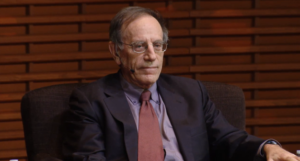Stanford Law’s Bob Weisberg on Epstein Charges
Charges were filed against Jeffrey Epstein on Monday, July 15, accusing the wealthy financier, who has links to powerful people including current and former presidents, of sex trafficking and other crimes. These new charges come a decade after similar charges against Epstein ended in a widely-criticized plea deal. Last Friday, criticism of that plea resulted in the resignation of Labor Secretary Alex Acosta, a former federal prosecutor who negotiated the deal. In the discussion that follows, Stanford Law Professor Robert Weisberg discusses the Acosta’s plea deal and the current charges against Epstein.
Can you explain the new charges filed by (SLS alum) Geoffrey Berman in New York?

Geoffrey Berman (SLS JD ’84), the head US Attorney in the Southern District of New York, has obtained indictments against Epstein for various offenses involving sex with minors, including charges under the umbrella of interstate trafficking, as well as money laundering and tax crimes involving the money implicated in the trafficking ring.
Was it significant that Epstein was arrested as he came off his private plane in New Jersey? I understand that his Manhattan mansion was searched soon after—and evidence uncovered.
Presumably the FBI was concerned that Epstein anticipated a search and might destroy or erase evidence. The strategy of avoiding this result by first arresting him in New Jersey was perfectly legal so long as the FBI had probable cause for the arrest. Incidentally, Epstein soon offered his house as collateral in his bail application, and in any event this and other assets might later be forfeited to the government, so the government might as well get a chance to enjoy the real estate it may soon own.
Do the new charges include crimes committed in Florida? What about the 2007 case and plea deal?
Even if the old plea deal remains solid, it would not bar new prosecution for crimes that were part of the same pattern of conduct in Florida in the early 2000s and certainly not for crimes committed in that same era in New York. Most obviously, so long as new victims have come forward, each victimization counts as a separate case of sex with a minor, so there is no double jeopardy. In addition, new charges involving other statutes like the money laundering and tax offenses and racketeering (so-called RICO charges) do not overlap with the original Florida charges in such a way as to be barred by double jeopardy.
Why was the Acosta plea deal criticized? What do you think was wrong about it?
Well, the concern that it was too lenient seems legitimate. Acosta and others seem to acknowledge that they felt overwhelmed by Epstein’s team of lawyers and network of rich allies—an unusual concession for someone representing the United States in a major criminal case (although he says that federal investigators and some of the victims were intimidated and even stalked by Epstein’s people.) Acosta’s deference to the state prosecutor doesn’t make a lot of sense. Federal prosecutors often work out arrangements whereby they will reduce or dismiss federal charges if they are satisfied that the state has dealt justly with the defendant, but they have no obligation to do so, especially where the state case seems so lenient. The then-Palm Beach prosecutor, Barry Krischer, has put the blame on Acosta, but there is plenty of blame to go around. The only officials who look good in this sordid episode are the two Palm Beach police officers who urged Krischer to file major felony charges and gave him lots of evidence. But Krischer, perhaps deferring to Epstein’s local power, even proposed to limit the charge to a misdemeanor and then settled on a single felony count of soliciting prostitution with limited incarceration.
One specific oddity stands out. The deal immunized various potential accomplices. It is not unusual for a plea deal to include a promise not to charge or go easy on close family members (as where two spouses who have small children are both nationally charged). But a deal protecting nonfamily possible accomplices is. One wonders if Epstein was bargaining not so much on behalf of protection for his allies but in effect protection from them, fearing that if charged they would drop any loyalty to him.
Can Acosta’s plea deal be overturned? It was criticized by a judge.
There is a very unusual legal question here. Normally a plea deal is very hard to undo after a judge accepts it. A defendant can occasionally undo a plea if she can prove that it was not knowing or voluntary or that she had ineffective assistance of counsel or that the prosecutor breached a term of the deal. The prosecutor can in theory undo a plea if she proves the defendant has breached. Here we have a set of victims asking a judge to undo the plea because the original trial judge did not give required notice to victims. This effort, led by Professor Paul Cassell (SLS JD ’84 and eminent victims’ rights advocate), faces high legal barriers.
What about Epstein’s employees, who are accused of aiding him in committing these crimes. Do you expect them to be charged or become witnesses?
If you add to employees various people who did some sort of business with Epstein, there may be a few who will at least be threatened with charges in offer to get their cooperation. My guess is that there will be some who will feel no disincentive to testify against him.
Robert Weisberg is the Edwin E. Huddleson, Jr. Professor of Law and Faculty Co-Director of the Stanford Criminal Justice Center. His scholarship focuses on criminal law, criminal procedure, white collar crime, and sentencing policy.
